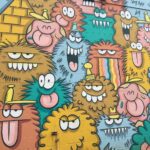Deep Analysis of “Chi: About the Movement of the Earth” Episode 3
What is “Chi: On the Movements of the Earth”?
“Chi: On the Movements of the Earth” is an anime adaptation of the manga by Uoto. Set in medieval Europe, it follows individuals who pursue the truth of heliocentrism despite the dangers it entails. This historical fiction explores the conflict between science and faith, as well as the human thirst for knowledge. The anime adaptation, released in 2024, has been highly praised by viewers.
One of the defining aspects of this work is its deep portrayal of characters who risk their lives in the pursuit of truth. Rather than merely recounting scientific history, it immerses viewers in the struggles, dilemmas, and ultimate choices of those who dare to challenge conventional beliefs.
Episode 3 Summary
In Episode 3, the protagonist, Rafau, learns about the existence of heliocentrism and realizes how dangerous this idea is considered in his society.
Previously, Rafau had been studying at a seminary, utilizing his natural intellect. However, an unexpected encounter exposes him to the radical idea of heliocentrism. While he instinctively senses the flaws in geocentrism, he also comes to understand the severe consequences of questioning the established order.
One of the most striking moments in this episode is Rafau’s conversation with his mentor, Hubert. Hubert asks him to consider the difference between “knowing the truth” and “speaking the truth.” While knowing something may not necessarily be a crime, expressing it openly could lead to persecution and death. This episode highlights the fear and weight of possessing forbidden knowledge.
Additionally, Rafau discovers an ancient manuscript detailing past attempts to prove heliocentrism. The document reveals that many before him had sought the same truth but met tragic ends as a result. This realization solidifies the perilous nature of his intellectual pursuit.
Deep Analysis and Foreshadowing in Episode 3
1. The Meaning Behind Hubert’s Words
Hubert’s emphasis on “the difference between knowing and speaking” reflects the intellectual climate of medieval Europe.
Religious authorities at the time viewed knowledge that contradicted church doctrine as a threat. Hubert’s words suggest that as long as knowledge remains private, it may not be considered a crime. However, the moment it is spoken or spread, it becomes heresy and a matter of life and death.
This line serves as foreshadowing for Rafau’s future. It sets the stage for the inevitable dilemma he will face: how far is he willing to go in his pursuit of truth, and what risks is he prepared to take?
2. The Significance of the Ancient Manuscript
The ancient manuscript Rafau finds highlights the long history of heliocentric thought. It underscores the fact that the heliocentric theory was not a sudden revelation but rather a hypothesis that had been explored and suppressed for centuries.
Furthermore, this scene emphasizes the recurring cycle of history—many individuals have pursued the same truth, only to be silenced by the powers that be. The manuscript symbolizes both the continuity of knowledge and the tragic fate of those who dared to seek it.
3. The Inheritance of Knowledge and the Burden of Choice
Episode 3 also underscores the idea that knowledge is inherited across generations. The manuscript Rafau finds is not just a collection of theories—it is a legacy left behind by those who came before him.
However, accepting this legacy means shouldering the responsibility and risk that come with it. In his time, heliocentric ideas are still considered heretical. To pursue this path is to invite persecution, imprisonment, or even death.
This theme resonates with the broader history of scientific progress. New discoveries and radical ideas often face resistance, yet humanity continues to push forward. Episode 3 challenges viewers to reflect on the cost of knowledge and the sacrifices made by those who seek the truth.
Conclusion
Episode 3 of “Chi: On the Movements of the Earth” is a pivotal chapter that delves into the weight of knowledge and the risks of intellectual pursuit.
- Hubert’s warning about “knowing versus speaking” illustrates the harsh realities of medieval thought control.
- The ancient manuscript reveals that heliocentrism was an idea pursued by many before Rafau, but at great personal cost.
- The episode raises profound questions about the inheritance of knowledge and the courage required to advance human understanding.
This episode leaves viewers pondering the nature of truth-seeking: What does it mean to truly understand something? And how much is one willing to risk for the pursuit of knowledge? The story continues to build momentum, making the next developments even more anticipated.


